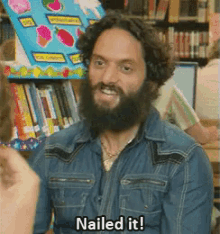So you’ve been querying your manuscript for what feels like forever, tirelessly researching agents, proofreading email drafts until your eyes bleed. And then you waited, and waited, and waited. Then maybe you revised, then you waited some more. And then finally! Someone said they want to represent you and your work! This is what you’ve been waiting for! Yay!
Now what?
I’ve been tweeting a few tips on offers of representation recently because I see a lot info out there about how to query, but not how to handle things once you get the thing you’ve been working toward. There are definitely a few do’s and don’t’s for this part of the process, and ways to make the lives of the agents who have your project easier (which could lead to even MORE offers). Spring is a big season for agents to make offers, so you might find yourself there soon enough! Read on for some tips!
OMG AN AGENT OFFERED ME REPRESENTATION…
Yay! Don’t accept right away. While you’re probably very excited to receive an offer, this is the part where you need to put your business cap on and put aside your writerly joy. Play it cool, play it cool 😉 You are talking about the person who is going to represent and guide your career, so you want to make sure it’s the best fit, which might not always be the first person who said yes. Be polite and respectful to the offering agent, tell them you’re excited, whatever, but tell them you will need time to make your decision. If an agent pressures you to decide too quickly, this might be a red flag. Standard turnaround time is 2 weeks or so (3 is probably more ideal), because now you need to close out your pending submissions and give everyone who still has your query a chance to offer as well.
Remember: you set the decision deadline, not the offering agent. Make sure you ask for enough time, or you may have other interested agents pass on your project just because they didn’t have enough time to finish reading! Don’t rush yourself or other agents by trying to figure it out in 5 days. A good agent will be flexible and understand that you need time!
Review your sub list for this project. Ok, now you have your window to deal with your submission list. What agents did you send this project to? If an agent has already passed, assume the pass is final. If they haven’t responded yet, they need to be notified that you received an offer.
Write an email to notify all agents with whom the submission is outstanding. It’s a courtesy (and an advantage for you) to let all the agents who have your project know that you received an offer. Don’t just say nothing or pull your submission without giving them a chance to throw their hat in the ring. Even if you’re madly in love with the agent who offered, you’re doing yourself a disservice by closing out your options prematurely. Plus, in rare cases an agent might withdraw their offer. Rare, but it happens, so you definitely want to keep all your doors open until it’s time to decide.
WRITING THE NOTIFICATION EMAIL
Write and send this email in the same chain of correspondence as your original submission. Please do this! This is one of my biggest pet peeves that maybe other agents don’t care about, but for the sake of this blog I am making a stand. It is very time consuming (and honestly annoying) to go back and find the original query, especially if it was sent months ago and your inbox search is as fussy as mine is.
Change the subject line of the email to say “OFFER OF REPRESENTATION: Title, Age Group/Genre of your project.” This allows everything to be in the same chain while still showing the agent there’s an update. Many agents skim through their inboxes to look for these on a daily basis, so make sure it’s front and center in that subject line to get a faster response.
Make it easy for the agents who still have your project to get back to you. This is a matter of giving them all the material they need to decide and the time to review it (2 weeks, folks!). Include your original query and synopsis below your email notifying of the offer (hence the advice on notifying in the same chain). If the agent has already requested a full or pages from you, be sure to re-attach them along with a synopsis so they’re right at the agent’s fingertips. This makes it more likely they’ll look at your project right away and get back to you faster, rather than getting distracted before they have a chance to search for the full you sent them 3 months ago. If they ask you for the full once you notify, be sure to send it ASAP so they have more time to read.
Keep the text of the email brief – include a reminder of what the project was, when you submitted it, and the date you need a decision by. This is just nice to refresh the agent’s memory about the history of your submission. Your deadline is the most important part. It saves the agent from having to ask, and also allows you to give yourself time to decide. Set a deadline for interested agents to get back to you that is at least 2 days before you agreed to tell the original offerer your decision. That way you will have some time to review any competing offers of representation and decide what is best for you. Lastly, include your contact info so they can reach out!
SAMPLE “OFFER OF REP” Email:
From: Timmy McWriterman
Sent: Monday, May 02, 2016 3:19 PM
To: Sally McAgent
Subject: OFFER OF REPRESENTATION: WHEN YOU WERE YOUNG, YA Literary Mystery
Dear Sally,
I’m writing to let you know that I have received an offer of representation for my YA literary mystery, WHEN YOU WERE YOUNG, which I submitted to you in October. You asked for the full, which I am re-attaching here, in February. Please find the original query and synopsis below for your reference.
I am looking to close out all pending submissions by end of business on Monday, May 16. If you are interested in the manuscript, please let me know by then and I’d be thrilled to discuss with you.
I look forward to hearing from you. Thank you again for your consideration!
All best,
Timmy
timmy@writerman.com
555-555-5555
—
Done! Now wait to hear back and keep track of responses as they come. On to the next phase:
OKAY, NO ONE ELSE OFFERED ON MY PROJECT. WHAT DO I DO?
That’s ok! You still have a choice. You can either go with the original offering agent (assuming you like them/feel they are a good fit) or turn down the offer. Up to you!
or
MULTIPLE AGENTS HAVE OFFERED ON MY PROJECT I AM EXCITED BUT SCARED HALP
Multiple offers are great! If you don’t get multiple, it’s ok, but having them is certainly a nice position to be in. So, here’s what to do next:
Research the agents who have offered again. You definitely did this before submitting because you’re an informed author who wants to put their best foot forward, right? But now you’re going in greater depth. Read their bios, their blogs, their websites. Stalk their Twitter for a while. You want to get a sense of how they present themselves and what kind of personality/agenting style they might have. You also want to research the agency as a whole to see how they fit into the larger publishing world. This will give you some background going into the next phase which is:
Talk to the offering agents by phone. Now is the time to pick up the phone and have a chat with the offering agents. Believe me, you want to do this part – hearing someone’s voice in conversation can give you a way better sense of them than reading their emails. On the call you want to ask about them – their history with their agency, what kind of project they typically deal with, their agenting style (hands on? hands off? editorial heavy?). You also want to ask them about you/your project – meaning, what vision do they have for the project? What publisher might they have in mind for it? Do they expect a revision? What do they think is working/needs work? You should get off the call with a clear sense of their enthusiasm for your work as well as how this person approaches their job. This will give you a better sense of whether or not you will mesh with them. Remember that it’s a professional relationship, but you also probably want an agent that you like as a person.
Note: be wary of agents who offer with the promise that they can sell your book for a million dollars, make it into a bestseller, whatever. No one can promise that. Also be wary of an agent who says your project doesn’t need revision. Most do. You’re better off going with someone who loves your book enough to make it better and fight for it, but will be transparent about the industry with you and help you manage your expectations.
Talk to their clients. Ask each agent for the names/contact info of one or two clients who can speak to their experience working with them. This might seem invasive but is totally ok and normal! Most clients are happy to talk about their experiences with agents.
OKAY SO I CHOSE MY DREAM AGENT! YAY! ANYTHING ELSE?
Yep! First, let the agent know that you accept their offer, obviously. You’ll probably need to sign an agency agreement with them (perhaps I’ll do a post about these somewhere down the line).
Lastly, let any remaining offering agents know that you’ve decided to go with another agent. You don’t have to go into detail, just drop them a note in that same email chain thanking them for their consideration and time. While you may feel like this is unnecessary now that you have the agent of your dreams, it’s never a bad career move to keep friendly communication open with everyone you deal with. Publishing is a small world, and you never know who you’ll cross paths with again!
After that, it’s onto the next part of your publishing journey. This was just the beginning!





















